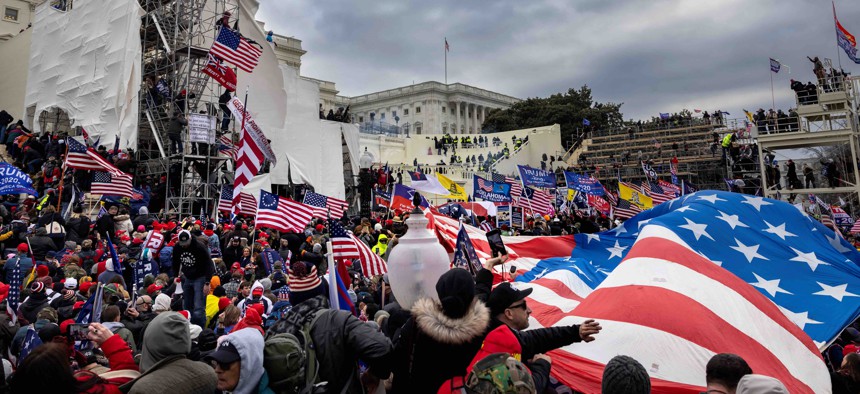22% of Republican State Lawmakers Nationwide Joined Far-Right Facebook Groups, Study Finds

Trump supporters clash with police and security forces as people try to storm the US Capitol on January 6, 2021 in Washington, DC. Demonstrators breeched security and entered the Capitol as Congress debated the 2020 presidential election Electoral Vote Certification. Brent Stirton/Getty Images
"We were shocked by what we found," says one person involved in the research.
Nearly 22% of Republican state lawmakers nationwide have joined at least one far-right Facebook group, according to a new survey by an advocacy group that tracks bigotry and attacks on democracy.
The Institute for Research and Education on Human Rights found 875 legislators representing all 50 states who have joined white nationalist, paramilitary, QAnon, anti-immigrant, “Stop the Steal” or other groups tied to the far right. The Facebook groups that the report focuses on are active on a range of issues, and not all of them embrace racist or nationalist ideologies.
“We wanted to have some sort of indicator of how far-right ideas have moved from the margins to the mainstream,’’ said Devin Burghart, executive director of the institute. “Frankly, we were shocked by what we found.”
The institute’s report, “Breaching the Mainstream,’’ contains a database of 789 far-right Facebook groups and lists the state lawmakers who have joined them.
The report defines “far-right” groups as those advocating for changes that would significantly undermine political, social and/or economic equality along class, racial, gender, sexual orientation, national origin, immigration status or religious lines.
Groups fighting government mask and vaccination rules and other public health efforts to contain the spread of the coronavirus are among those the report authors classified as far right. They included 23 anti-abortion groups as well.
The institute looked at all 7,383 state legislators across the U.S. who served from 2021 to 2022.
Republicans held 4,011 of the seats and the study found that 872 of those lawmakers, or 21.74%, had joined the far-right Facebook groups. The same was true for three Democrats. The researchers found no Libertarian or Independent lawmakers who had joined the groups.
Ties between Republicans at all levels of government and far-right groups have come under increasing scrutiny since the Jan. 6 attack on the U.S. Capitol. High-profile members of Congress, including Marjorie Taylor Greene of Georgia and Paul Gosar of Arizona, have come under fire for their provocative statements and affiliation with white nationalism.
On Saturday, an 18-year-old white supremacist was arrested for a mass shooting at a supermarket in Buffalo, New York that killed 10 people. His manifesto contends that Americans of European heritage are being replaced by immigrants.
The report found several far-right paramilitary and anti-immigrant Facebook groups who support anti-immigrant and white nationalist causes.
“These channels have been used to promote ‘the great replacement,’ the idea that inspired the Buffalo shooter to carry out his horrific act,’’ Burghart said. The anti-immigrant ideology “is increasingly common in these channels and it’s being parroted by far-right state legislators.“
The report links the lawmakers who belong to hard-right Facebook groups with a rise in legislation seeking to limit access to the ballot, restrict the rights of LGBTQ people and control what public school children can learn about America’s legacy of racism, among other topics.
“All of that stuff has been incubated in these networks,’’ Burghart said. “That rhetoric in this context becomes public policy quite quickly and those ideas not only move from the margins to the mainstream but now they’ve been codified into law in some places."
According to the report, 75% of the lawmakers who joined far-right groups are men. While every state legislature had at least one member who had joined a far-right group, the percentage was highest in Alaska at 35%. Other states with a high percentage of lawmakers who joined the far-right groups include Arkansas (25%), Idaho (22.86%), Montana (22.67%) and Washington (21.41%.)
“To find it in virtually every corner of the country was a wake up call as to how far this stuff has spread and how it can sink its roots in any where," Burghart said. “An increasing number of legislators are exposed to this activity and are now joining these groups…[that] is a sign that we’ve got a much bigger problem on our hands than anticipated.’’
The institute regularly monitors far-right groups, Burghart said. “We then queried that data against a database of all state legislators' personal, campaign, and official Facebook profile URLs,’’ he said.
“Once we found matches, we double-checked, verified, and cataloged them,’’ he said. The report did not examine other social media sites.





